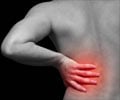Chronic and frequent back pain may be responsible for elevated death risk, finds a new study.

TOP INSIGHT
Back pain is the principal cause of disability globally and is associated with earlier death among older women. Better management of back pain over the lifespan could prevent disability, promote quality of life, and eventually extend life.
Read More..
Back pain is the leading cause of disability worldwide, and women aged 40-80 years have the highest prevalence of back pain. Also, women report more frequent and debilitating back pain compared to men. The proportion of adults over the age of 65 is increasing rapidly in the United States, and optimizing physical health to extend life for older adults is a well-documented public health goal.
"To our knowledge, our study is the first to measure disability after measurement of back pain. This allowed for a prospective analysis of back pain that persisted over time and later rates of disability, which may help explain the association between back pain and mortality," said Eric Roseen, DC, MSc, a research fellow at Boston Medical Center and leading author of the study.
"Our findings raise the question of whether better management of back pain across the lifespan could prevent disability, improve quality of life, and ultimately extend life."
After taking baseline measurements of back pain, researchers followed up with participants two years later and measured back pain again. In year four, participants were asked about and observed doing common activities of daily living. The study found that disability following the measurements of back pain explained much of the association with mortality.
While the study's findings are consistent with prior studies that found older women with daily or disabling back pain had elevated mortality risk, why this association occurs remains unclear.
These results lay the foundation for future studies to assess the long-term impact of back pain treatments and self-care strategies. Clinicians should assess physical function in older adults with back pain and recommend guideline-based management, which encourages the use of less invasive treatments.
Source-Eurekalert
 MEDINDIA
MEDINDIA




 Email
Email










